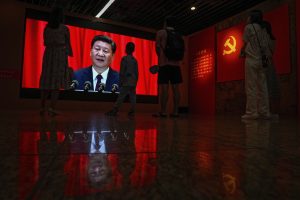When 13 young Chinese men, a Dutchman, and a Russian met in the French concession of Shanghai on a hot July day in 1921, they could not have imagined that the organization they were launching, the Chinese Communist Party, would drive of one of the greatest revolutionary upheavals of all time. Nor could they have foreseen that less than 30 years later, the CCP would seize power, and 100 years later it would lead an economic superpower that many in Washington now view as the United States’ greatest rival on the global stage. What would those early founders have thought if they gazed upon China today under the leadership of General Secretary Xi Jinping?
From its origins, the party sought to transform the nation’s society, economy, and politics to bring about “wealth and power.” To that extent, they would be proud of today’s CCP but baffled by the current embrace of capitalism and its role within the world order. This raises the question of whether the communist revolution was one of nationalism or communism. From its founding, the answer is both. The young intellectuals saw Leninism as a vehicle to drive China toward its rightful place in the world. In October 2019, Xi Jinping linked his “China Dream of national rejuvenation” to the original mission of the CCP, which was to bring happiness to the Chinese people and rescue the nation from its national humiliation at the hands of the foreigners. He noted that if one never forgot why one started, then “you can accomplish your mission.”
The Role of Tradition
Yet, from day one, the party also portrayed itself as providing a radical break with the past. During the first decades of the 20th century, critical intellectuals attacked the Chinese tradition and its inheritance. A common slogan was “down with the old Confucian shop.” Traditional practices of authority and behavior, including sexual mores and gender roles, were heavily criticized as the young tried out different lifestyles, embraced feminism, and demanded liberation from the repressive institutions of the household, clan, and religion. The only way to interpret the world was through the lens of class and class warfare. The CCP was part of a global revolution destined to overthrow the colonial world order and usher in a new world led by the representatives of the proletariat. There would be no place for capitalists, landlords, or foreign exploiters. Despite temporary, tactical alliances, class warfare was the name of the game. Before and after 1949, landlords were extinguished; in the 1950s, the foreigners were expunged, the private business community squeezed and eliminated. In the 1960s, Mao Zedong turned his ire on those within the CCP whom he saw as taking the revolution back down the road toward capitalism.
Xi Jinping no longer portrays the party as representing such a radical break with the past. Following Mao’s death in 1976, the CCP began to shun his approach to politics, with the leadership turning to economic revival. Class reconciliation replaced class conflict and the CCP began to rely on private enterprise to deliver the much-needed economic goods. By the end of the 1990s, Jiang Zemin encouraged private entrepreneurs to join the party now described as representing the “advanced elements” of society. As a result, the party today primarily represents the interests of the new elites in Chinese society rather than the proletariat and the peasantry.

































